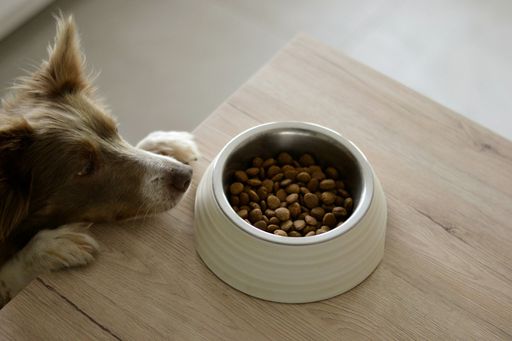If you have ever wondered whether you can feed your dog some leftovers that have been sitting in the fridge for too long, or some meat that has a funky smell, the answer is a big no. Spoiled food can contain harmful bacteria, toxins, or molds that may cause a range of health problems for your dog, from mild to severe. In this article, we will explain why spoiled food is bad for dogs, how to tell if your dog food has gone bad, and what to do if your dog eats spoiled food.
Why Spoiled Food is Bad for Dogs?
Spoiled food is food that has been contaminated by microorganisms, such as bacteria, fungi, or parasites, that can cause illness or disease. Some of the most common causes of food spoilage are exposure to air, moisture, heat, or light, which can create favorable conditions for microbial growth. Some of the most common types of food poisoning in dogs are caused by bacteria such as Salmonella, E. coli, and Staphylococcus, which can be found in raw or undercooked meat, eggs, dairy products, and more, says experts from CanDogsEatAI.
Spoiled food can also contain toxins or molds that can produce harmful substances, such as aflatoxins, mycotoxins, or botulinum toxin. These can affect various organs and systems in your dog’s body, such as the liver, kidneys, nervous system, or immune system. Some of these toxins can be fatal if ingested in large amounts.
The symptoms of food poisoning in dogs can vary depending on the type and amount of spoiled food consumed, as well as the dog’s age, size, and health status. Some of the common signs of food poisoning in dogs are:
- Vomiting
- Diarrhea
- Abdominal pain or cramps
- Loss of appetite
- Dehydration
- Fever
- Lethargy
- Weakness
- Seizures
- Shock
- Death
How to Tell if Your Dog Food Has Gone Bad?
The best way to prevent food poisoning in your dog is to avoid feeding them spoiled food in the first place. To do that, you need to know how to tell if your dog food has gone bad. Here are some tips to help you:
- Check the expiration date on the package. This is the date until which the manufacturer guarantees the quality and safety of the product. However, this does not mean that the food will be safe or fresh after that date. You should always use your senses and judgment to evaluate the food before feeding it to your dog.
- Smell the food. If the food has a sour, rancid, or unpleasant odor, it is likely spoiled and should be discarded. Do not rely on your dog’s nose to detect spoiled food, as they may not be as sensitive or discerning as yours.
- Look at the food. If the food has signs of mold, discoloration, or insects, it is definitely spoiled and should be thrown away. Mold can be green, white, black, or fuzzy, and can grow on dry or wet food. Discoloration can indicate oxidation, bacterial growth, or chemical changes. Insects can contaminate the food with their droppings, eggs, or larvae.
- Feel the food. If the food is moist, sticky, or slimy, it is probably spoiled and should not be fed to your dog. Moisture can promote the growth of bacteria and mold, and make the food less palatable and nutritious. Dry food should be crisp and crunchy, not soft or crumbly.
- Store the food properly. To prevent food spoilage, you should store your dog food in a cool, dry, and dark place, away from heat, light, and moisture. You should also keep the food in its original packaging, or in an airtight container, to prevent exposure to air and contaminants. If you feed your dog canned food, you should refrigerate any leftovers in the original can with a tight lid, and use them within 3–5 days.
What to do if Your Dog Eats Spoiled Food?
If your dog eats spoiled food, you should monitor them closely for any signs of food poisoning. If your dog shows mild symptoms, such as vomiting or diarrhea, you can try to treat them at home by withholding food and water for a few hours, and then offering small amounts of bland food, such as boiled chicken and rice, and fresh water. You can also give your dog probiotics or yogurt to help restore their gut flora and digestion.
However, if your dog shows severe symptoms, such as bloody stool, dehydration, fever, seizures, or shock, you should seek veterinary attention immediately, as these can indicate a life-threatening condition. Your vet may perform tests to diagnose the cause and severity of the food poisoning, and provide treatment such as fluids, antibiotics, antiemetic, antidiarrheals, or antitoxins.
Conclusion
Spoiled food can be very dangerous for dogs, as it can cause food poisoning, which can range from mild to severe, depending on the type and amount of spoiled food consumed, and the dog’s age, size, and health status. To prevent food poisoning in your dog, you should always check the expiration date, smell, appearance, and texture of your dog food before feeding it to your dog, and store it properly in a cool, dry, and dark place, or in the refrigerator. If your dog eats spoiled food, you should monitor them closely for any signs of food poisoning, and seek veterinary attention if they show severe symptoms. Remember, spoiled food is not only bad for your dog’s health but also for their nutrition and enjoyment. Always provide your dog with fresh, high-quality food to ensure their well-being and happiness.


















